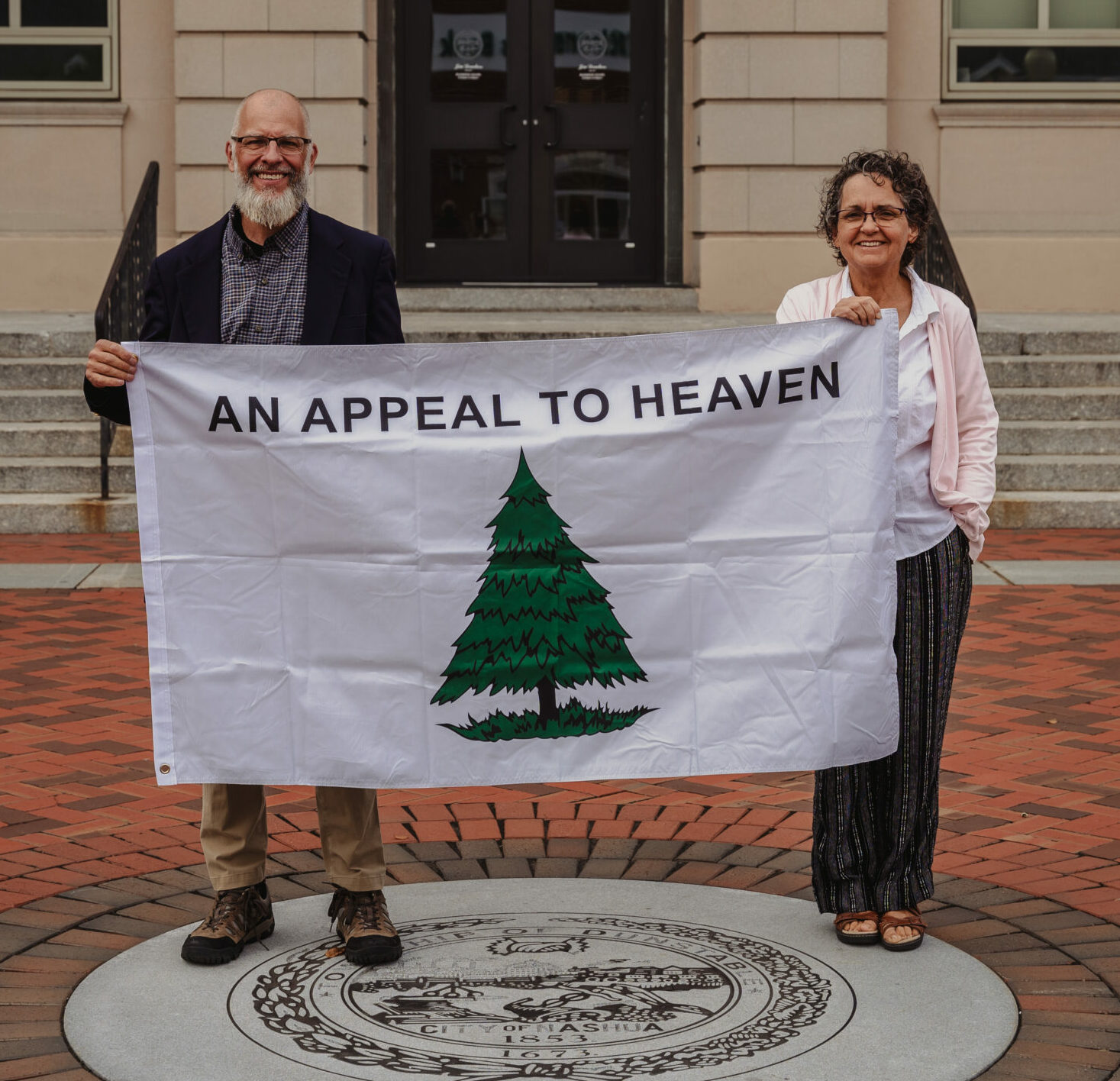It’s not an Appeal to Heaven, but to the First Circuit Court of Appeals for Nashua residents Beth and Stephen Scaer in their Pine Tree flag fight with the city.
The Scaers filed a lawsuit seeking an injunction against Nashua after they were denied an application to fly the Revolutionary War-era banner, which includes the slogan “An Appeal to Heaven,” by Nashua officials. On Friday, lawyers for the Scaers’ filed notice in the federal court of their intention to go to the appeals court in Boston.
Last Month, United States District Court Judge Landya McCafferty denied their motion for a preliminary injunction, ruling the couple was likely to lose their case on the merits. McCafferty relied on Magistrate Judge Talesha Saint-Marc’s review and report of the case in her ruling.
According to McCafferty and Saint-Marc, the city did not violate the Scaers’ free speech rights when it denied their flag application. They argue the city’s application process for requests to fly flags on the city’s Citizen’s Flag Pole is an example of an allowable government speech restriction that does not infringe on the First Amendment.
Nathan Ristuccia, an attorney with the legal nonprofit The Institute for Free Speech, insists the court is wrong and that the treatment of the Scaers, who are outspoken political conservatives, is viewpoint discrimination.
“The City of Nashua cannot manipulate government speech doctrine into a ruse for subsidizing viewpoints they like and discriminating against those they disfavor,” Ristuccia wrote in a motion arguing against Saint-Marc’s report. “The City has sought to maintain the Citizen Flag Pole as a forum for favored constituents while using its written policy to create a superficial appearance of compliance with (prior free speech ruling) Shurtleff v. City of Boston.”
In the past, the Nashua city government has allowed flags celebrating Pride Month, transgender rights, as well as ethnic heritage with the national flags of Greece and the Dominican Republic. However, the city has also rejected previous requests to fly symbols advocating pro-life politics, libertarianism, and protecting women’s sports from biological males.
The city adopted a flag pole policy in 2022, after several rejected applications, that states in part, “[the] flag pole is not intended to serve as a forum for free expression by the public.”
Ristuccia calls the policy an attempt at invoking “magic words” to get around the First Amendment claims of people whose applications were rejected. The Scaers had their Pine Tree Riot flag rejected in 2024 when the city informed them the Revolutionary War banner is not “in harmony with city policies and messages that the city wishes to express and endorse.”
The city’s rejection of the Pine Tree Riot flags is not about Nashua officials harboring royalist sentiment. Instead, officials are being swayed by current political prejudices seemingly shared by Saint-Marc. In her report, Saint-Marc determined the flag the Scaers wanted to fly is a symbol that’s been coopted by the “far right.”
“The record also indicates that the flag was used during the Jan. 6, 2021 attack on the United States Capitol Building in Washington, D.C.,” Saint-Marc wrote.
City Attorney Jonathan Barnes likened the Scaer’s request to fly the Pine Tree Riot flag at city hall to flying a Nazi flag during his arguments in front of Saint-Marc.
“I mean, [Ristuccia] would have you believe that we can raise the Nazi flag to commemorate Hitler’s birthday. I think that’s totally unreasonable, and it certainly wouldn’t be in the city’s best interests to do that,” Barnes said in court.
The 1772 Pine Tree Riot took place in Weare and is considered a pivotal event that led to the American Revolution. The flag has long been associated with patriotic movements. The Scaers wanted to fly the flag on the anniversary of the Battle of Bunker Hill to honor New Hampshire Minutemen.

